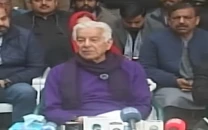Quetta Inquiry Commission: Top court hints it may tone down language of report
Partially accepts interior ministry’s plea to provide material related to the commission’s proceedings

Relatives mourn outisde Quetta hopsital. PHOTO: AFP
“Perhaps we may dilute the language [of the report] subject to record. You have to draw a line between the ministry and the person [minister],” Justice Amir Hani Muslim told the interior ministry’s counsel Makhdoom Ali Khan on Monday.
Reply to Quetta Commission : Ministry argues against ‘haste’ in banning outfits
In the original report compiled by SC Justice Qazi Faez Isa, the Quetta Inquiry Commission (QIC) had highlighted the ministry’s ‘monumental failure’ in countering terrorism and objected to Interior Minister Chaudhry Nisar Ali Khan’s meeting with the leader of a banned outfit, as well as ‘delays’ in proscribing militant groups.
Responding to the report, the ministry last week filed in the Supreme Court its 64-page reply in which it not only defended the ministry but also requested the court to expunge various parts of the report.
Justice Hani was heading the Supreme Court’s three-judge bench hearing a suo motu case about the Quetta blast which left more than 70 persons dead.
During the hearing, Makhdoom Ali Khan told the bench that the commission’s report made derogatory observations regarding the interior minister, adding that had the observation been made against the ministry instead of the minister then it would have been a different matter.
The counsel, however, said the ministry had no objections to the commission’s recommendations.
Regarding meeting of the interior minister with Maulana Ahmad Ludhianvi – head of Ahle Sunnat Wal Jamaat, a banned outfit – Makhdoom contended that the minister was meeting a delegation of Difa-e-Pakistan Council, which is not a proscribed organisation.
“The list of participants was not conveyed [to Nisar] and the minister was not aware that Ludhianvi was part of that delegation,” he said, adding that the report gave an impression that the minister accepted demands of the delegation and was socialising with outlawed outfits on a daily basis.
Makhdoom said he had no objection to the commission’s authority but the objections were only raised as observations against the minister.
He said the decision whether to ban an organisation was made after the intelligence agencies’ report. He pleaded to expunge the adverse remarks, adding that the apex court in a series of cases had expunged adverse remarks while maintaining the judgment.
Justice Hani observed that hard work of the commission should be appreciated, adding that it is not the job of judges to carry out an investigation. The commission performed functions which were supposed to be done by the departments, he said, adding that there was no proper training of investigation officers.
He also observed that the court wanted to know these things in the larger interest of public and country, adding that the bench was not sitting with a pre-determined mind. However, he observed that there are certain pockets in Punjab where proscribed organisations continued to operate.
The judge also observed that according to the report, the ministry responded to the commission’s inquiry after a delay of three months while under the standing operating procedure [SOP] of the ministry it should have responded to within 10 days.
Later, the bench accepted the ministry’s plea to provide material related to the commission’s proceedings, on which the QIC report is based. However, it did not allow providing the confidential documents, based on reports of agencies, against which privilege was already sought.
The bench allowed Hamid Khan – counsel for Balochistan Bar Council – to submit his response over the ministry’s 64-page objections. Hamid said if the ministry withdrew its recent reply then they had no issue. However, otherwise, he said, they would file their response.
Quetta hospital carnage: Judicial commission exposes chinks in anti-terror armour
The court gave two weeks to Makhdoom Ali Khan for filing specific objections after examining the material on the basis of which the report was written. Meanwhile, Makhdoom sought time to get instruction from his client regarding the bench’s observation about the dilution of language.
The bench also took strong exception to the fact that three provincial secretaries were still working on their posts, despite the SC’s 2013 judgment, and had got orders in their favour from the Balochistan High Court and the Services Tribunal.
It expressed wonder at how the high court or tribunal could pass an order after the apex court’s judgment. The court summoned all records of the secretaries’ case and also issued notice to them to appear at the next date of hearing.
Earlier, Advocate General Amanullah Kanrani told the bench that though the provincial government had issued notification regarding repatriation of the secretaries to health, communication and works and public safety but they had obtained relief from the high court and service tribunal. The hearing of the case has been adjourned for two weeks.
Published in The Express Tribune, February 7th, 2017.



















COMMENTS
Comments are moderated and generally will be posted if they are on-topic and not abusive.
For more information, please see our Comments FAQ